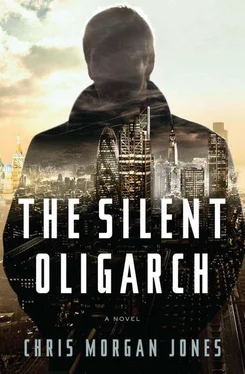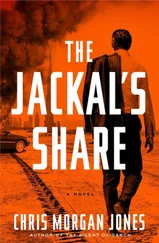He leaned forward and took another biscuit, still trying to project confidence.
“All right. But you know how delicate this is.”
“I do.”
“Do you trust him?” Lock, delaying, nodded to the empty space where Griffin had sat.
“Completely. He’s worked with me for five years.”
“Why haven’t I seen him before?”
“Because it hasn’t been a criminal defense matter before. Which is what this is.”
“It’s an arbitration, for God’s sake. An arbitration. We’ve sat through or settled a dozen of them.” Lock was becoming a little louder and sarcastic now, beginning to gesticulate.
“This is different, Richard. Because of where it may end up. Because they’re accusing you of being a criminal. Even if Tourna isn’t shit-stirring, and he will be, if that tribunal thinks you’re a money-launderer—even hints at it—you can guarantee that the Swiss will be all over it, the Americans—God knows who else.”
The Swiss. The Americans. The unnamed others. With unassailable authority, indefatigable, righteous, rooting out the wrongdoers and sending them to jail. But if Lock went down, so would Malin, and Malin, therefore, wouldn’t let him. Therefore he was safe. There was logic to this. For a brief time he even welcomed the idea of relinquishing control of this mess to Kesler.
OVER THE COURSE of the next six days Lock tried to tell Kesler everything. Six days and five evenings with Kesler, Griffin and the junior, describing a professional lifetime of routine, dishonest transactions. Almost a whole week in Bryson’s offices. Bored but nervous, he insisted on sitting opposite the large window that looked east toward Liverpool Street, so that while he talked he could watch London become lower and sparser as it faded into the east, finally giving hints of the countryside beyond. It was hot out there, clearly, but in their conference room (still quite a sizable one, Lock noted—he might no longer be a client, he might even be a criminal, but at least his boss was important enough to run up impressive fees) the temperature was steadily just above chilly.
Lock didn’t have access to his files, but this hardly mattered because he knew it all. He explained to Kesler that his first piece of work for Malin had been in 1993, when Malin was head of the Ministry of Industry and Energy’s Transportation department. He had told Lock that he wanted to take advantage of some opportunities in the private sector, and for this would need an offshore company capable of making investments in Russia. It would also need an offshore bank account, into which payments could be made. This first company was Spirecrest Holdings, now defunct, and it had been a minor mistake. It had soon been replaced by a Cyprus company, Arctec Holdings, which for a while had done exactly what Malin had wanted. Money from Russia flowed into it and was then funneled back into Russia, to be invested in small independent gas producers and oil equipment manufacturers.
Kesler wanted to know where the money had come from. Lock explained that at the beginning he didn’t really know. He only saw payments coming in. His job wasn’t to worry about where the money was made but simply to process it and make sure it didn’t attract the attention of the taxman—or anyone else. He knew that payments were sometimes made in cash (in the days when cash wasn’t a problem), sometimes from other offshore companies, sometimes from more established Western companies, but in every case its precise origin he could only guess.
Arctec had had the most simple of structures. It had few assets—cash, mainly, safely stowed in a Swiss account—and was owned by a Liechtenstein anstalt, a particularly impenetrable form of company which was in turn owned by a Liechtenstein trust: Longway Trust, the beneficiary of which was not named. Any taxman or investigator trying to find out who owned Arctec would be lucky to get as far as Liechtenstein, but there would meet a thick wall of impenetrable Mitteleuropean discretion.
Arctec would have taken a morning, at most, to discuss. Now, though, the whole affair was very much more complex. It was its own world. Faringdon Holdings, right in the middle, held assets in over forty different companies in Russia and its neighbors. Up above it was a consortium of nine shareholders, each of which owned a roughly equal share. These shareholders were companies registered in the British Virgin Islands, in Cayman, in Malta, in Gibraltar, all over. Lock had set up each of these and each one had its own shareholders in many different places. And above these was another layer still, every company lovingly incorporated by Lock. Draw the whole thing, and it would look like an hourglass, if you stood far enough back. Finally, when it seemed like there was no end to it, everything came together in the airless heights of the scheme in the only constant, Longway, the same unbreakable trust that Lock had set up almost fifteen years earlier. A finial, of sorts.
Kesler and Lock went over every company in the scheme. Griffin had eventually counted and announced that there were eighty-three of them. (These were just the live ones—they ignored for now the dozens that had done their job and been discarded.) Each had a bank account, which Lock, with help, had set up. Each had its directors, whom Lock had had to find. Each required that its fees be paid every year to the local company register; Lock estimated that the annual expense was well over a million dollars. Most had a story that Kesler was determined to know.
On it went. When they had systematically worked their way from the middle of the hourglass to the top and then back to the bottom, Kesler again relieved his colleagues and came to settle on the three questions that seemed to exercise him most of all.
“So, Richard, where does Malin get his money?” he asked when Griffin and the junior had left the room.
“What do you mean?”
“Well, in the ministry he earns what, a thousand dollars a month? But that’s not how he lives. How does he get cash?”
Lock looked down at his hands and then back at Kesler. “There are two Russian consulting companies that provide services to companies in the group. They lend money to him sometimes.”
“Is that all?”
“The companies I look after don’t pay for anything. He’s very careful about that. If money is made in Russia and comes to him in Russia, I wouldn’t know about it. I don’t see it. I only know about everything outside Russia. That’s my job.”
Then Kesler wanted to know who owned Longway. Lock told him that he, Lock, owned it.
“You mean that you own Faringdon?”
“All of it,” said Lock.
“You’re rich.”
“I am. I sometimes wonder why I don’t feel better about it.”
“Why?”
“Well, it’s not always the most comfortable place to sit.”
“No. No. Why do it that way?”
“Why did we do it that way? We changed it three years ago. Think about it. If anyone ever sees the deeds of that trust and Malin’s name is on them he has nowhere to fall back to. Everything is clearly his. There’s nothing left to deny. My name on it creates an extra layer. And you have to prove a negative—that I don’t own it. That’s not easy.”
“He must trust you.”
Lock laughed grimly. “It’s not like I can run off with it all.” More to the point, he thought, Malin knows that I’m a coward. The whole scheme depends on it.
But for the rest of that day, most of an afternoon and into the evening, Kesler grilled Lock on what he called “the real crux”: how the money was made. Where did it come from? What of value was exchanged for it? Could it be shown that it was made honestly? More to the point, could it be shown that it wasn’t? Over and over, Lock said that he really didn’t know.
Читать дальше












